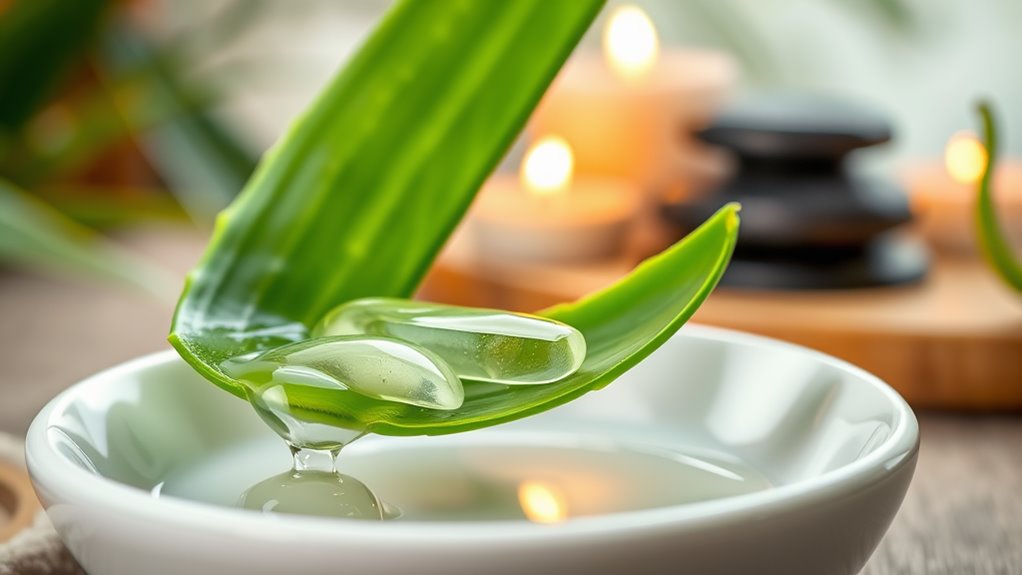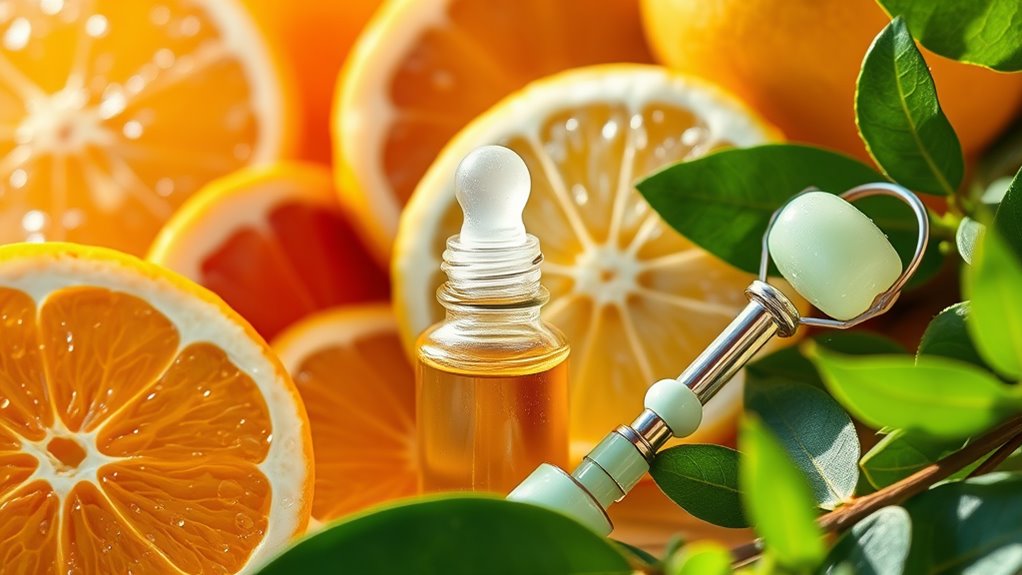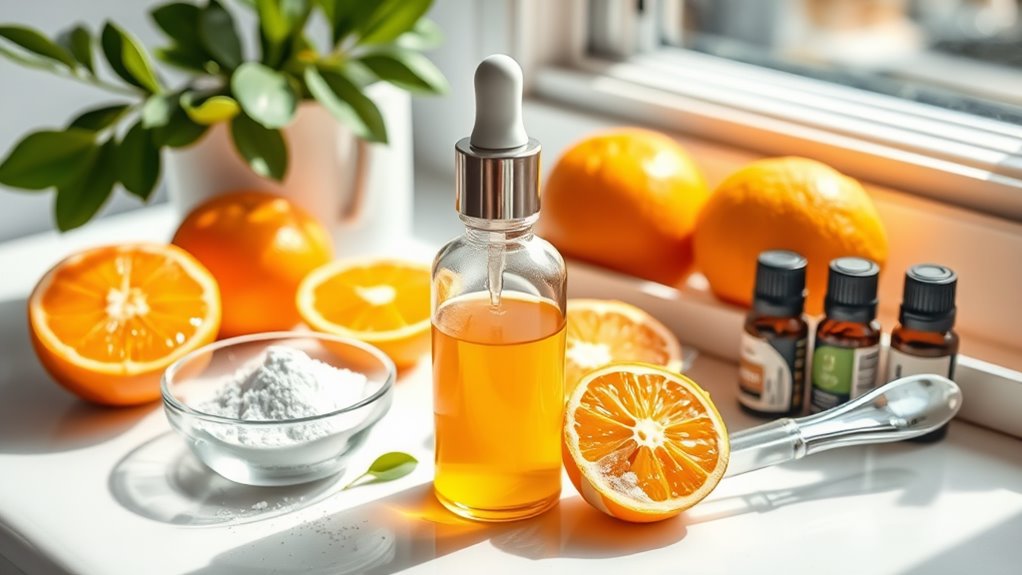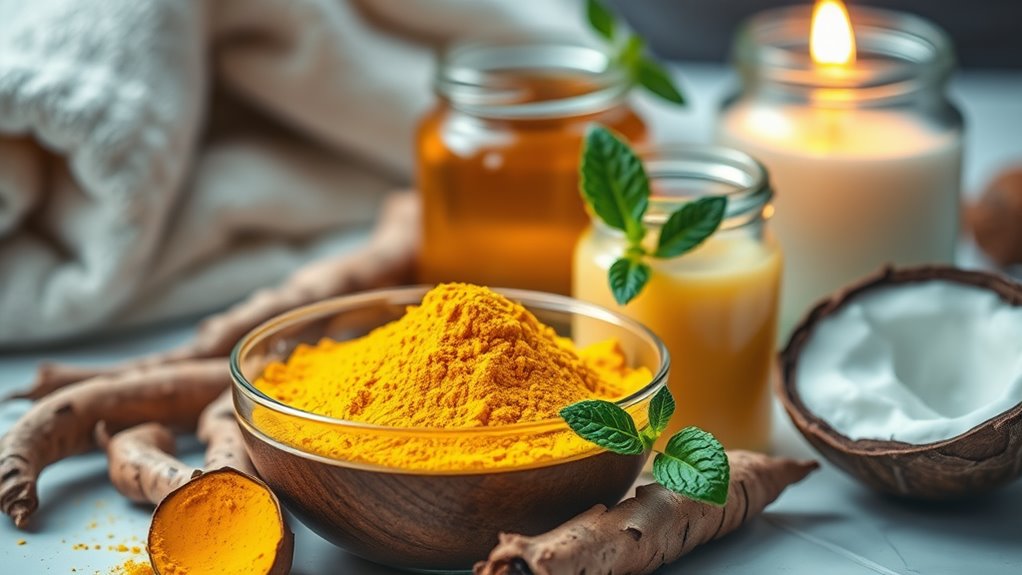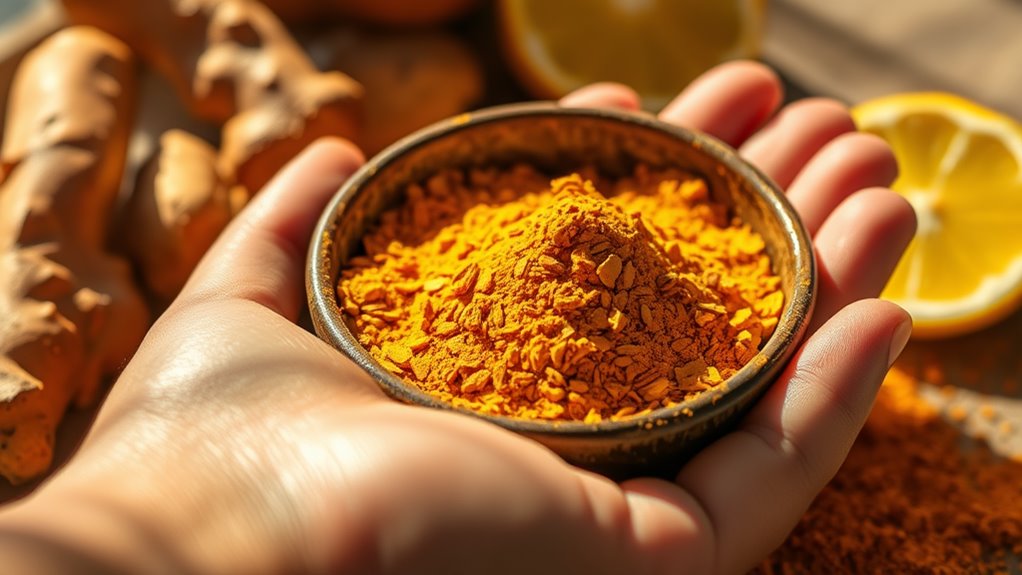How Aloe Vera Can Repair Skin Overnight
Aloe vera can repair your skin overnight by deeply hydrating and promoting healing while you sleep. Its lightweight gel locks in moisture and provides essential nutrients, thanks to its high water content and restorative compounds. As you rest, aloe vera accelerates cell regeneration and soothes inflammation, helping to reduce redness and irritation. With consistent use, you’ll notice improved texture and resilience. If you’re curious about how to maximize these benefits, there’s more to discover.
Key Takeaways
- Aloe vera gel promotes cell regeneration overnight, enhancing skin healing and repair while you sleep.
- Its high water content acts as a humectant, providing deep hydration and locking in moisture.
- The anti-inflammatory properties soothe accumulated skin irritation, reducing redness and swelling by morning.
- Rich in amino acids, aloe vera supports collagen production, maintaining skin elasticity and firmness overnight.
- Applying aloe vera before bed allows for optimal absorption of its healing nutrients during your skin’s rest period.
The Science Behind Aloe Vera’s Healing Properties
When you apply aloe vera to your skin, you’re tapping into a powerful natural remedy backed by science. Studies reveal that aloe vera skin contains compounds like glycoproteins and polysaccharides, which promote healing and reduce inflammation.
These elements work synergistically to accelerate cell regeneration, essential for repairing damaged skin. Moreover, the antioxidants in aloe vera combat oxidative stress, further enhancing your skin’s ability to recover. Its antibacterial properties help prevent infections, making it ideal for treating wounds or acne. Additionally, using pure aloe vera gel as an overnight treatment can significantly enhance its effectiveness in delivering these benefits.
How Aloe Vera Provides Deep Moisture to the Skin
Aloe vera acts as a natural hydrator, delivering deep moisture to your skin. This succulent plant’s unique composition guarantees your skin remains supple and nourished.
Here’s how aloe vera provides that essential moisture:
-
High Water Content: Aloe vera is composed of over 95% water, instantly hydrating your skin on application.
-
Humectant Properties: It attracts and retains moisture, preventing dehydration throughout the day.
-
Nutrient-Rich: Packed with vitamins and minerals, it feeds your skin while keeping it moisturized.
-
Lightweight Texture: Its gel-like consistency absorbs quickly without leaving a greasy residue, making it ideal for all skin types.
Additionally, aloe vera’s healing compounds work effectively during nighttime skin repair, enhancing its moisturizing effects.
Incorporating aloe vera into your skincare routine can profoundly enhance your skin’s hydration levels, leading to a radiant and revitalized complexion.
The Role of Aloe Vera in Reducing Inflammation
Aloe vera’s anti-inflammatory properties can make a noticeable difference for your skin.
When you apply it, you’ll find it helps soothe irritation and redness, promoting healing.
Understanding how it works can empower you to harness its benefits for better skin health.
Anti-inflammatory Properties
While many natural remedies claim to soothe irritated skin, few match the powerful anti-inflammatory properties found in aloe vera. By incorporating aloe vera into your skincare routine, you can effectively reduce redness and swelling.
Here’s how it works:
-
Calms Inflammation: Aloe vera contains compounds like acemannan that inhibit inflammatory responses.
-
Promotes Healing: Its anti-inflammatory effects help accelerate skin recovery.
-
Hydrates Skin: Aloe’s moisture content supports skin health, reducing irritation.
-
Soothes Sunburn: Applying aloe vera can provide immediate relief from sunburn-related inflammation.
Utilizing aloe vera not only addresses inflammation but also enhances your skin’s overall resilience.
Skin Healing Mechanism
Understanding the skin healing mechanism is essential for leveraging aloe vera’s powerful benefits. Aloe vera acts as a natural anti-inflammatory agent, reducing redness and swelling. Its gel contains compounds like aloin and acemannan, which help to calm inflamed skin and promote faster recovery.
Here’s a visual representation of aloe vera’s role in reducing inflammation:
| Component | Function |
|---|---|
| Aloin | Reduces inflammation |
| Acemannan | Stimulates cell regeneration |
| Enzymes | Break down dead skin cells |
| Antioxidants | Protects skin from free radicals |
Collagen Production: How Aloe Vera Boosts Skin Elasticity
When it comes to maintaining youthful skin, boosting collagen production is key, and that’s where aloe vera shines. This powerful plant not only hydrates but also stimulates collagen synthesis, enhancing your skin’s elasticity.
Here’s how aloe vera contributes to this process:
-
Rich in Amino Acids: Aloe vera contains essential amino acids that are building blocks for collagen production.
-
Promotes Cell Renewal: The gel encourages skin cell turnover, helping to maintain a youthful appearance.
-
Hydration: Its deep moisturizing properties prevent dryness, which can lead to collagen breakdown.
-
Anti-Inflammatory Effects: Aloe vera reduces inflammation, allowing for peak collagen synthesis.
Aloe Vera as a Natural Antioxidant
Aloe vera not only hydrates and repairs your skin but also acts as a powerful natural antioxidant. This gel is rich in vitamins C and E, which combat free radicals that accelerate skin aging.
When you apply aloe vera, its antioxidants neutralize these harmful molecules, reducing oxidative stress and promoting a youthful appearance. You’ll find that aloe vera helps protect your skin from environmental aggressors, such as pollution and UV rays.
Incorporating it into your skincare routine can enhance your skin’s resilience, allowing it to recover more effectively. By harnessing the benefits of aloe vera, you’re not just treating your skin; you’re actively fortifying it against future damage.
Embrace this natural remedy and experience the transformative effects on your skin’s health.
Nighttime Skin Repair: The Best Time for Aloe Vera Treatment
While your skin rests overnight, it’s the perfect time to harness the restorative powers of aloe vera. This natural wonder works wonders while you sleep, allowing your skin to absorb its benefits fully.
Here’s why nighttime is ideal for aloe vera treatment:
-
Enhanced Absorption: Your skin is more receptive, allowing deeper penetration of nutrients.
-
Cell Regeneration: During sleep, your skin repairs itself, and aloe vera accelerates this process.
-
Hydration Boost: It locks in moisture, combating overnight dryness.
-
Calming Effect: Aloe vera soothes inflammation, reducing redness and irritation that may have accumulated throughout the day.
Additionally, using aloe vera in your routine can complement your evening skincare routine, maximizing its effectiveness as your skin undergoes overnight repair.
How to Use Aloe Vera for Maximum Skin Benefits
To get the most out of aloe vera, you’ll want to focus on the best application techniques and ideal timing for use.
Combining it with other beneficial ingredients can amplify its effects on your skin.
Let’s explore how to maximize these benefits for a radiant complexion.
Best Application Techniques
When you’re ready to harness the full potential of aloe vera for your skin, applying it correctly can make all the difference. Follow these techniques to maximize its benefits:
-
Pre-Cleanse: Always start with a clean face. Gently wash away impurities to enhance absorption.
-
Fresh Gel: Use fresh aloe vera gel from the leaf for the highest potency. It’s more effective than store-bought options.
-
Gentle Massage: Apply the gel using circular motions, allowing your skin to absorb it fully. This boosts circulation and promotes healing.
-
Layering: For extra hydration, layer a moisturizer on top. This locks in the aloe’s benefits, creating a protective barrier.
Ideal Timing for Use
Have you ever wondered when’s the best time to apply aloe vera for your skin? The ideal timing is essential for maximizing its benefits.
Nighttime is often the most effective, as your skin enters repair mode while you sleep. Cleanse your face thoroughly before application to enhance absorption. Apply a generous layer of pure aloe vera gel just before bed, allowing your skin to soak in its nutrients overnight.
This method not only hydrates but also promotes healing and reduces inflammation. If you prefer daytime use, apply it after sun exposure to soothe and rejuvenate your skin.
Combining With Other Ingredients
Combining aloe vera with other beneficial ingredients can greatly enhance its skin-repairing properties. By blending it with these potent elements, you’ll maximize its effects and nourish your skin more effectively:
-
Honey: Its antibacterial and moisturizing qualities complement aloe’s soothing effects.
-
Coconut Oil: This deeply hydrates while providing a protective barrier, ideal for dry skin.
-
Tea Tree Oil: Known for its antiseptic properties, it helps combat acne while aloe soothes irritation.
-
Vitamin E: This powerful antioxidant helps to repair skin damage and enhance hydration.
Experiment with these combinations to tailor your skincare routine.
You’ll not only enjoy the benefits of aloe vera but also the added potency of these powerful ingredients, leading to healthier, revitalized skin.
Potential Side Effects and Precautions
Although aloe vera is widely celebrated for its skin benefits, it’s essential to be aware of potential side effects and precautions before incorporating it into your routine. Some individuals may experience allergic reactions, leading to redness, itching, or irritation. To avoid this, always conduct a patch test on a small skin area before widespread use.
Additionally, if you’re pregnant or nursing, consult your healthcare provider prior to using aloe vera, as its safety isn’t fully established in these cases. Remember to choose high-quality products, as additives can exacerbate adverse effects.
Finally, avoid applying aloe vera to open wounds or severe burns, as this might lead to infection. Stay informed and cautious to maximize the benefits of aloe vera for your skin.
Real-Life Success Stories: Transformations With Aloe Vera
Wondering how aloe vera can transform your skin? You’re not alone! Many individuals have experienced remarkable changes by incorporating this powerhouse into their skincare routine.
Here are some real-life success stories:
-
Acne Scars Faded: Users have reported significant reduction in the appearance of scars after consistent aloe vera application.
-
Sunburn Relief: Aloe vera’s soothing properties helped individuals heal sunburns overnight, restoring skin comfort.
-
Eczema Management: Regular use provided relief from itching and irritation, leading to clearer skin.
-
Moisture Boost: People with dry skin noticed improved hydration and softness after just a few uses.
These transformations highlight aloe vera’s effectiveness.
With dedication, you too can achieve stunning results and master your skincare journey!
Frequently Asked Questions
Can Aloe Vera Be Used on All Skin Types?
Aloe Vera’s gentle properties make it suitable for most skin types. It hydrates, soothes irritation, and calms inflammation. However, it’s best to patch-test first, ensuring it works well with your unique skin needs.
How Quickly Can I See Results From Aloe Vera?
You’ll typically see results from aloe vera within a few days to a week, depending on your skin’s condition. Consistent application enhances its effectiveness, helping your skin heal and look healthier over time.
Is Organic Aloe Vera Better Than Regular Aloe Vera?
When choosing between organic and regular aloe vera, you’ll find organic often offers higher purity and fewer chemicals. This can enhance your skin’s health, so consider opting for organic to maximize your skincare benefits.
Can I Mix Aloe Vera With Other Skincare Products?
Yes, you can mix aloe vera with other skincare products. Just make certain the formulations complement each other. Test on a small area first to avoid reactions, and maximize the benefits for your skin’s health.
How Should I Store Aloe Vera for Freshness?
To keep aloe vera fresh, store it in an airtight container in the refrigerator. This prevents oxidation and maintains its potency. Always use clean utensils to avoid contamination and extend its shelf life effectively.

